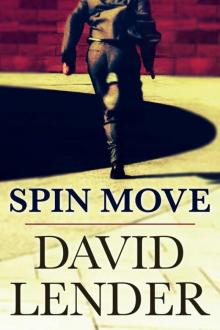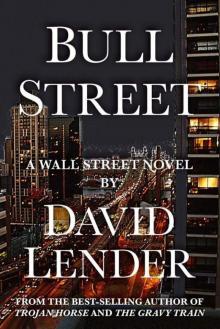- Home
- David Lender
Spin Move Page 2
Spin Move Read online
Page 2
“That certainly doesn’t sound like a situation, Mr. Holden, that gives your suspicions any credence, now does it?”
Holden clenched his jaw.
“It sounds to me, Minister James, like Antiguan public officials have reverse engineered the alias of a fugitive financier who has very cleverly scattered his money around into the right hands. As a recently appointed senior official in the government of Antigua and Barbuda, you must know that any public scandal involving a host of your officials would be embarrassing to your administration, and a stake in your own political heart. If I have to keep burrowing into this, who knows what corruption inside your government I might turn up? But the arrest and extradition to the U.S. of a long-wanted felon would be a public relations coup for you. I’m certain it would elicit the loudly proclaimed gratitude of the U.S. Justice Department. So, Dr. Minister, can I tell my boss, the U.S. Attorney General in Washington, that I am receiving the full support of the government of Antigua and Barbuda in a matter of significant interest to the United States Justice Department?”
Holden waited. No response, and then he heard a long exhale at the other end of the line.
“Mr. Holden,” James said, “I can assure you that the government of Antigua and Barbuda has always spared no expense or resources in cooperating with the United States of America, most particularly your Justice Department. I will give this matter my immediate attention and revert to you with my findings, posthaste. Now I wish you good day, sir,” and the line cut off.
Holden pulled the handset away from his ear, sneered at it, then slammed it onto the phone.
Ten hours later Katie landed in Geneva after transfers through Lisbon and Munich. She checked into the Hotel du Rhone, exhausted, and went directly to bed.
The next morning she slept late, ate a light breakfast and jumped into a cab to the offices of Banque d’affaires Ducasse. She stepped out of the cab on Rue Beauregard not knowing what to expect, but now realized the setting was appropriate for a private Swiss financial advisory firm dating back hundreds of years. Number 4 was a four-story, 17th-century town house with a limestone facade, with a simple oak door with a glass panel in it. Neither the door nor the facade bore the name of the Ducasse firm. The door was recessed into a carved limestone archway and topped by a cast-iron lantern that extended over the sidewalk. The narrow street housed a row of similarly anonymous buildings.
She tried the door; it was unlocked and she entered into a vestibule. She announced herself to a receptionist sitting behind an antique desk and moments later was led up to a third-floor reception area where she sank into the leather cushions of a Chesterfield sofa that felt like down pillows. The floor was covered with Oriental rugs that overlapped each other. After a few minutes she decided they were arranged that way to prevent the distraction of clacking heels on the oak floors as 20- and 30-something professionals glided past without a sound. They wore blue or gray suits adorned with pocket squares and shirts with white collars and cuffs, and had the air of intensity she’d cultivated as a young lawyer. The walls were paneled mahogany, covered with oil paintings of old people and rising 15 feet to plaster moldings that curved into a gilded ceiling. The chairs were leather and tapestry, worn to an aged patina but not to the point of shabbiness. The place smelled of leather, oiled wood and money. Katie took it all in.
After about ten minutes she stood and looked out the windows at a magnificent park surrounded by granite buildings that appeared to be museums. She was still admiring the scene when she heard someone come through the door on the far wall. She turned. A trim man in his 40s walked directly to her, stopped in front of her and inclined his head.
“It’s quite a different view on this side of the building out over Place des Casemates, don’t you agree?”
“Yes.”
“Father’s office is on this side, overlooking the park, Promenade du Pin, but I prefer to face the serenity of quiet little Rue Beauregard.”
He wore a form-fitting suit, a lavender shirt and a flowered lavender tie with a rose in his lapel.
Quite the dandy. She figured he set the tone for the nattily clad young professionals.
The man said, “Mrs. Conklin, it’s a pleasure.” His accent was international-school English, with a slight British intonation and perfect diction.
“Angela, please.” Katie shook his hand.
“I am Philippe Ducasse. Thank you for coming.” He turned and motioned toward the door he’d come through. “Shall we begin?”
Ducasse walked Katie through the door into a room that was an over-the-top version of the reception area. Rugs were piled upon rugs, mahogany wainscoting running to chair-rail height on the walls with burgundy faux finish on the plaster above it, more paintings of old men, furniture jammed in as if Ralph Lauren and Federico Fellini had competed with each other over decorating it. Every square inch was crammed with leather and wood, every horizontal surface covered with objets d’art and scores of picture frames featuring Ducasse smiling out of them with beautiful people Katie didn’t recognize.
Ducasse said with obvious pride, “My office.”
He pointed to the pediment-topped bookshelves behind his oversize walnut desk. “The books are organized into biographies, decorating and fashion.” He flicked a hand around the rest of the office. “Out here we wanted more of a Madeleine Castaing look.”
Katie’s face went blank. What?
“A French decorator famous for mixing French, British, Russian and discarded junk pieces.”
Katie didn’t respond.
“Very French Vogue,” he said. “I find it a refreshing contrast to the designer’s approach in the reception area—too elder traditionalist in my view.” He paused as if for a reaction, and when he didn’t get one he then pointed to a chair for Katie and took his seat behind his desk. He settled in and smiled for the first time. “Thank you for coming, Angela. As you’ll see, we at Banque d’affaires Ducasse take a very personal approach with each of our clients. We’d like to count you among them.”
Katie had started to relax in the reception area, but was beginning to find Ducasse a little off-putting, this pasty-faced man who walked like he had a stick up his ass, now talking to her like maybe, just maybe, he’d one day grow into his inflated demeanor.
Then Ducasse folded his hands and leaned forward with his arms on his desk and said, “Now, let me take you through our presentation.” He made a display of pushing a button beneath his desk. A panel on the wall to his right slid back and an LCD screen behind it lit up.
“Banque d’affaires Ducasse is a family-owned Swiss firm dating back five generations, counting among our peers the esteemed private investment banking houses of the Rothschild family and Lazard Frères.”
Ducasse clicked through a number of slides showing photographs of the paintings of some of the old men she recognized from the walls of the reception area, various Ducasses, all stalwart Swiss entrepreneurs, he assured her, committed to the financial advancement of their clients.
“As a banque d’affaires, we do not accept deposits or make loans. We function as a private investment bank to elite clients who seek our services in mergers and acquisitions, structured private financings and other specialized finance negotiations. Our client list is completely confidential—we never publicize our transactions or advisory assignments, regardless of how groundbreaking—and we select only clients whose wealth and stature in the world will assure the continued discreet profile of our firm.”
Ducasse looked from the screen to Katie. She nodded. He clicked to the next slide.
“Ten years ago we embarked on a new venture with the creation of our first private equity fund, Ducasse PE Fund I. With this we’ve quietly become a major factor in investing in uniquely profitable special situations, agnostic as to nationality or structure of the transaction.”
She’d read most of this on their website and had been briefed on it
by Mr. Bemelman, her private banker at Amalgamated Swiss Bank, where her money was stashed in a private account. Bemelman had recently recommended Ducasse as someone who could help her meet her private investment needs.
Ducasse then ran through slides showcasing the various home-run investments of Ducasse PE Funds I through IV—homebuilding sites in South Carolina that paid out 4 to 1 after the housing market in the U.S. recovered from the financial crisis; a vacation time-share business that paid out 10 to 1 after they bought it out of bankruptcy and teamed up with the founder to rejuvenate it; an island off the coast of Dubai that Rod Stewart abandoned as a money sinkhole after Dubai collapsed and which Ducasse Fund III repurposed into an adult amusement park.
Ducasse sent Katie’s eyelids fluttering for the following 45 minutes by pushing the button under his desk to change slides, none of which interested her. Every so often he would throw a glance at her that she thought was intended to be provocative, like she was supposed to be impressed. Katie was starting to wonder if the man had ever gotten laid, because half his gestures looked like they were more designed to attract similarly pasty-faced Swiss bankers than athletic former lawyers for the U.S. Attorney’s Office who had in fact gotten laid more than once or twice, although not enough lately, thank you very much, and, incidentally, owned a house on five acres of beachfront on Boa Vista, Cape Verde, and wasn’t at all impressed with his French Vogue–style office.
When Ducasse got to the slides on rates of return for their previous four private equity funds, Katie woke up. Wow! She sat up straight.
Ducasse said, “Yes, I see a reaction. Internal rates of return on each of our four existing private equity funds of 32%, 37%, 41% and 29% net to our investors, after our 20% carried interest. While the private placement language says, ‘Past performance is no indication of future performance,’ we believe we can do better still. Our first fund was $100 million, the second $250 million, the third $500 million, the fourth $1 billion, and our objective for our current, fifth, fund is $2 billion.” Again he leaned forward and rested his forearms on his desk and made solid eye contact with Katie.
“We think you are exactly the profile of our core investor. Young, wealthy, with adequate discretionary income to allow us to hold a significant portion of your assets and grow them meaningfully over the next 5 to 7 years.” He clicked to another slide showing a series of bar graphs, each substantially bigger than the last. “You’ve indicated an interest in investing $15 to $20 million in our Fund V. The attached chart assumes a $20 million investment, and shows its growth in value over each of the next seven years, based on past performance.”
Katie sat up and squinted at the screen.
“As you’ll see,” Ducasse said, “your $20 million investment, based upon the weighted-average rate of return of 33.49% of our first four funds, would grow to $151 million by year seven, roughly 7.5 times your initial investment.” He leaned back in his chair as if waiting for a reaction.
Katie just looked at him.
Ducasse said, “That is assuming you accept payouts from the existing fund without investing in our subsequent funds.” He clicked up a new slide and looked at the screen. “This slide depicts what your return would have been had you invested in fund number one and continued to invest in each of our subsequent three funds by rolling over your distributions from the first fund into the second, then the distributions from the second into the third, and so on. As of today, your initial $20 million investment would have grown to $247 million, or 12.3 times your initial capital over seven years.” Ducasse leaned back in his chair again. “Mrs. Conklin, our firm offers the most discreet seclusion of your investor participation in our funds from any outside prying eyes. We are keenly aware of who your ex-husband is and know that his notoriety might foreclose you from similar investment opportunities. As such, we believe Banque d’affaires Ducasse presents you with one of the most unique investment opportunities in the world.”
Katie didn’t like him threatening that nobody else might take her tainted money, but smiled anyhow.
Ducasse said, “Let me be abundantly clear. That means that as traditional Swiss bankers, we don’t care where your money comes from, including if it was from your ex-husband’s ill-gotten gains.”
The presentation went on for another half hour, most of which seemed to Katie like boilerplate they could’ve done without, but she figured their lawyers had insisted upon it. After Ducasse turned off the screen and closed the panel on his office wall again, he said, “Can I answer any questions?”
“I need to digest this,” Katie said. “But you should know I’m interested, still at the $15 to $20 million level.”
Ducasse leaned toward her and said in a lowered voice, “You should be aware that we are offering our initial investors in Ducasse Fund V an unusual opportunity.” He paused, as if Katie would be sitting on the edge of her chair to hear this. She realized this was the final pitch and decided not to show any reaction. Ducasse went on. “Our first ten investors will be afforded the opportunity to invest alongside Banque d’affaires Ducasse as partners. Normally we ask our investors to commit to an investment amount, which we then draw down with capital calls as we fund our investments. However, if you would step up to the level of $30 million and fund it immediately, we would offer you the opportunity to share in our profits as sponsors of the fund.”
Katie leaned forward, now interested.
“If you were to deposit the full $30 million in funds with us today, we would offer you a three percentage-point share in our 20% carried interest in sponsoring the fund. What this means is that you would receive 3% of any profits of the fund, and reduce our share of profits to 17%. So if you were to have done so from our first fund, your net returns as an investor over the last four funds would have been increased to 35%, 40%, 44% and 32%. Going forward, that would mean your $30 million investment over a seven-year time horizon would grow to $265 million.” Ducasse paused.
Katie felt a tremble someplace in her body, not sure where it was, but realized this was an opportunity that she might not see again.
Ducasse said, “As I said, we are a private, family-owned firm. We pride ourselves on affording our clients both complete discretion and unique opportunities to profit from the relationships we’ve developed over five generations. We hope that you will join us as a member of our invitation-only private club, and become part of our lucrative family of investors who will continue to profit from the investments we continue to see around the world.”
Ducasse stopped and looked at Katie, once again as if for a reaction.
At that moment someone knocked on the door. “That must be Father,” Ducasse said.
A man in his 80s with a full head of white hair stepped through the door, wearing a tailored double-breasted suit and a pin-dot tie against a white shirt with a spread collar. Ducasse stood up. “Father, glad you could make it. This is the potential investor I told you about. Please meet Angela Conklin.”
The man crossed the room with the stride of one in his 50s as Katie stood to meet him. “A pleasure, Mrs. Conklin.” The elder Ducasse never made a move to sit down, so they all stood and talked for a minute or two, and then the man excused himself and left.
Ducasse said, “Hopefully you’ll get to know him better. He’s still active in the business on a daily basis.” When they sat back down, he said, “I gather you’re not flying home until tomorrow. May I suggest I buy you a casual dinner tonight, allow you to ask me any questions you might have? Or not. Either way, will you allow me to show you some of the more quaint aspects of our beautiful city?”
Katie felt warm for the first time since arriving in Geneva. Maybe the man wouldn’t be such bad company for the evening. “That would be nice. Thank you.”
At 7:00 p.m. the bellman called upstairs to let Katie know her car had arrived. She checked herself one last time in the mirror: a simple but elegant black dress, not too much makeup, a g
old chain with a solitaire diamond around her neck and diamond earrings. Okay, ready.
When she emerged from the revolving doors of the Hotel du Rhone, a chauffeur held open the rear door of an antique Bentley. He drove them out of the main commercial section of Geneva, through winding streets and up the hill into Old Town. He stopped the car in front of a house on a cobblestoned street of three- and four-story town houses. The driver had obviously called ahead, because when Katie climbed the limestone steps, Ducasse was waiting for her with the door open. He was smiling, looking much less formal than in the office, wearing a tan peaked-lapel suit, again with a rose in his lapel, and a magenta-and-lilac tie over a lilac-and-purple-checked shirt.
“Thank you so much for coming,” he said and leaned forward to kiss her on each cheek. “Please, this way.” He led her into an intimate sitting room off the main hall, with lilac-painted walls and minimalist furniture. They sat in upholstered chairs adjacent to each other by a coffee table on which hors d’oeuvres were arranged around a silver champagne bucket and glasses.
“That’s a beautiful suit,” Katie said, meaning it.
“Thank you. The suit is Dries Van Noten, the shirt and tie Charvet.” He waved a hand at the room. “And as you can see, lilac is my color.” He leaned forward and grabbed the bottle of champagne, poured. “Champagne is a perfect way to get to know each other better, don’t you think? I’ve made a reservation at 8:30 p.m. at one of my favorite restaurants here in Old Town, so we’ve plenty of time to get acquainted before dinner.”

 Arab Summer
Arab Summer Sasha Returns
Sasha Returns Spin Move
Spin Move Bull Street (A White Collar Crime Thriller)
Bull Street (A White Collar Crime Thriller) Vaccine Nation
Vaccine Nation Trojan Horse
Trojan Horse